Top safety measures vital to avert disasters
By Dhaneshi Yatawara
In 1984 December, the world experienced the worst industrial disaster
in Bhopal in Madhya Pradesh India. On December 3, 1984, methyl
isocyanate gas leaked from the facility during the early hours of the
morning while local residents slept. This is cited as one of the
chemical industry's greatest tragedies. The loss of lives of innocent
people can never be valued and treating and compensating affected
communities would have cost hundred times more than the actual profit of
the business and the benefit to the country in economic development.
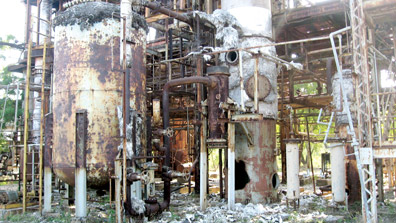
A deteriorating section of the chemical plant in Bhopal, India |
The Bhopal Gas Tragedy Relief and Rehabilitation Department under the
Government of Madhya Pradesh State describing the disaster said, "On the
morning of December, 3, the whole world learnt about the holocaust in
shocked disbelief".
The tragedy took an immediate toll of about 3,000 lives and left
thousands and thousands of citizens physically impaired or affected in
various degrees. Livestock were killed, injured and infected. Business
was interrupted. Environment was polluted and the ecology affected with
flora and fauna disturbed. Such was the enormity of the tragedy that all
available instruments in the field of health care, administration and
law were found to be inadequate." Early in 1985, the Department of
Bhopal Gas Tragedy Relief and Rehabilitation was created under the
charge of the Chief Minister to undertake the colossal task of relief
and rehabilitation.
In addition to all aids and assistance, monetary and otherwise, that
underwent to recover communities and environment the Indian Government
in 2010, with the approval of the Union Cabinet extended a 12,650
million Indian rupees aid package that was funded by Indian taxpayers
through the government. Though homes and streets which the disaster made
desolate, once again hum with activity there still stands needs among
people and the environment in their recovery process.
Since then the entire world has been giving focus to strengthen the
existing disaster management systems in a chemical disaster and
countries that lacked such a system initiated programs to find the most
suitable way to be safe. Sri Lanka, without a broad network of based on
chemicals, never really felt the need of a safety measure in a
chemical/gas accident. Chemical accidents are all time possible
whereever chemicals are transported, stored or used. Efforts to prevent
accidents range from improved safety systems to fundamental changes in
chemical use and manufacture, referred to as primary prevention or
inherent safety.
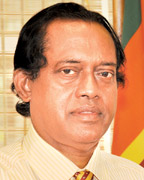 |
| Wimal
Rubasinghe |
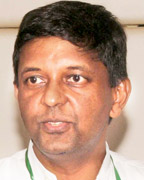 |
| Prof. Ajith de
Alwis |
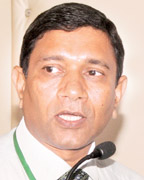 |
| Dr. Sanjaya
Rathnayake |
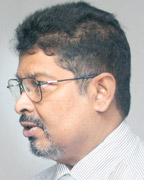 |
| K.H.
Muthukudaarachchi |
At present with many attempts taking place to economically develop
the country, we need to be open to various industries. Parallel to these
efforts the country at present is in the need for a solid mechanism to
manage a chemical disaster, guiding the industrialists as well as
protect the people and environment. Thus, to suit the fast growing
industrial nature of the country, the Central Environment Authority has
taken an initiative to set up such a disaster management system before
the country is loomed with chemical industries.
According to the Central Environment Authority, a number of chemical
industries have applied for the Environment Impact Assessment reports as
well as to other relevant documents to get approval to start their
industries. "This is a high time for Sri Lanka to look into this subject
as many industries are coming to Sri Lanka. Many of these industries
come with hazardous chemicals. Already we have a list of nine massive
industries some are to be set up in and around the Hambantota Port,"
said the present Acting Director General of the CEA K.H.
Muthukudaarachchi.
As Muthukudaarachchi said, to give a green light to these industries
the country needs to be prepared to manage chemical hazards and should
be armed with hazardous waste disposal sites and without these the
authorities can not approve these industries.
The Government cannot keep on denying these industries because the
legal and infrastructure frame work in insufficient.
"So we have to start up with establishing a proper base in order to
control the possible disasters that could happen with hazardous waste,"
Muthukudaarachchi said.
In that sense the Task Force established under the CEA to establish a
disaster management strategy in its initial stages are establishing a
list of existing chemical industries. The CEA is requesting management
of such institutes to establish proper disposal sites and hazardous
waste management programs.
Establishing a proper disaster management framework is a ten month
project implemented under the CEA funded by the United Nations
Environment Program. "The Task Force will come up with a country
situation report and an assessment - thus understanding what kind of
assistance we need to establish," he said.
Director of the Environment Pollution Control Division of the CEA Dr.
Sanjaya Rathnayake said that Sri Lanka, to continue with massive scale
chemical industries, need to include new provisions in the legal frame
work and establish necessary infrastructure. "Similar programs have been
established in Philippines and Cambodia and we are hoping to exchange
their experience in this as well," Rathnayake said.
As Chairman of the CEA Wimal Rubasinghe said these strategies work
hand in hand with the assistance of the people as well. "The Government
vision is to have a clean, environment friendly country while developing
as a country. The law is there to take action against those who pollute
and harm the environment and the people. What we need is more and more
public support in reporting, complaining to us about such polluters in
addition to our network established island wide," Rubasinghe said.
While the public attention is crucial we as an institute need to be
more vigilant too, he said. "I have worked as an Assistant Government
Agent for nearly 16 years and with my experience the CEA officers at the
regional level can do a far more better job," he said. "Actually it is
our officers who should get the information first at any environment
issue - be it pollution, or red rain. Our officers do a lot of work at
the ground level but there are lapses at certain instances due to many
reasons. So at present we are looking deep into this problem and trying
to set up an efficient system," Rubasinghe said.
As the country is now targeting a 100 billion dollar economy while
attempting to double the per capita income, we should give a serious
thought on a mode to generate money to meet this demand and obviously we
have to go for a broader spectrum of industries, said Prof Ajith de
Alwis of Department of Chemical & Process Engineering, University of
Moratuwa.
"So depending purely on tea and tourism are not going to get us
there. We need manufacturing in strategic areas which will benefit the
country. Because there are a lot of material that can convert to value
added goods. Using many resources available with us like nanotechnology
we have a wide opportunity to create adding value to local manufacturing
goods and really capturing a fare share of the market then driving the
growth in a system," Prof. de Alwis said.
Best practices
"When we try to economically develop what happens is that
manufacturing facilities will come in to the country. Then the question
is if an accident happens in these industries are we ready?" he said.
"If an accident happens in such an industry the country will be at a
total loss. Because we will not be having many chemical plants - with
the capacity of the country may be only one or two plants. An accident
in one plant means we are falling way down from our great ideologies in
economic development. We cannot afford such accidents taking place in
the country. Social, economic and environment costs all come with such a
disaster. So as a result preparedness is the best way forward," he said.
As Prof. De Alwis said, preparedness shows the country how best the
industrial activities should be carried out being safe from the
inception. "Being safe from the initial stages the country and
industrialists can concentrate on activities to develop the industry
rather focusing on managing accidents and disasters every day," he said.
For the moment, Sri Lanka does not have mega factories operating, yet
we hear a few instances of chemical accidents and pollution - i.e. some
deaths, fires and explosions. These places can face accidents over silly
moves. If we are having accidents in premises of those industrial
institutes at this level that means our preparedness is low. We are not
really ready and our attitude and discipline is low, according to Prof.
de Alwis. We as a country still do not pay detail attention on how to
make these industrial places safe.
"We don't have adopted best practices, standard operating procedures,
wearing safety equipment. When someone wears safety attire it depicts
that he or she is making other people safe too. If one person does not
take precautionary measures it will not only harm that individual but
will badly affect people around and fellow workers," he said. When the
attitude, discipline of the people change the type of bad behaviour
among people causing pollution can also change. Bad practices have to
move out. So that is why we are trying to promote internationally
accepted standards for the institutes, according to him. As Prof. De
Alwis said if the country is going towards a different intensity of
industries we really need to up-scale our approach to these
developments. That is an imperative. We need to change our attitudes and
disciplines. And build capacities in the system and probably change the
industry landscape to realise the benefit. |



